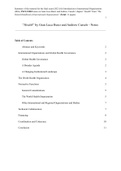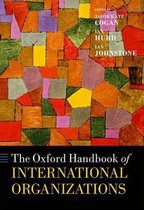Summary of the material for the final exam (2021) for Introduction to International Organisations
(IIOs). INCLUDES notes on Gian Luca Burci and Andrew Cassels’ chapter “Health” from “The
Oxford Handbook of International Organizations” (Total: 11 pages).
1
“Health” by Gian Luca Burci and Andrew Cassels - Notes
Table of Contents
Abstract and Keywords 2
International Organizations and Global Health Governance 2
Global Health Governance 2
A Broader Agenda 2
A Changing Institutional Landscape 3
The World Health Organization 4
Normative Functions 5
General Considerations 5
The World Health Organization 5
Other International and Regional Organizations and Bodies 7
Technical Collaboration 7
Financing 8
Coordination and Coherence 10
Conclusion 11
, 2
Abstract and Keywords
The political importance of health as an international and global issue has changed radically.
➔ International health organizations started with a mandate to control the spread of infectious
diseases between countries as a by-product of trade.
➔ Work is central to economic development, poverty reduction, human rights, sustainable
development, and the effective management of globalization.
➔ The growing number of institutions involved in global health suggests the need for a much
clearer division of labour in order to allow each one to play to its respective strengths.
Health is an integral and essential dimension of human life and livelihood, as recognized in
international relations (IRs) and international law.
Health has always had an international dimension. More recently with the:
● Growing number of actors involved.
● More sophisticated conceptualization of global health as a political and legal regime.
● Search for more effective models of governance.
Global health governance is a complex and fragmented field; including international governance, with
new hybrid international entities and private actors.
International Organizations and Global Health Governance
Global Health Governance
Global Health Governance: The assets the world has at its disposal to improve peoples’ health through
the use of formal and informal institutions, rules and processes by states, intergovernmental
organizations (IGOs), and non-state actors to deal with challenges to health that require cross-border
collective action to address effectively.
➔ Originated from:
◆ Negotiations between nation-states as they sought to protect or promote people’s
health.
◆ Initially on an ad hoc basis to contain the threat of communicable diseases, then more
formally through treaties, conventions, international and regional institutions
(establishment of the World Health Organization - WHO).
A Broader Agenda
Factors instrumental in broadening the health governance agenda and making it more complex to
manage:
● Multiple Voices: Health governance is no longer the exclusive preserve of nation-states.
Actors (e.g. civil society networks, individual non-governmental organizations - NGOs -,
philanthropic foundations, etc..) all have a new voice and influence on health decision-making
thanks to information technology and social media.
➔ This is challenging for IGOs as they have to prioritise their member-states in making
policy decisions, while still finding constructive ways to engage other stakeholders.
, 3
● New Money and Institutional Complexity: Global health benefited from increased political
prominence (from the 2000s) in part due to the world’s response to the HIV/AIDS pandemic,
with Official Development Assistance (ODA) greatly increasing.
➔ These new mechanisms for channelling and disbursing funds have nevertheless made
health governance increasingly complex and fragmented particularly in low and
middle-income countries with many development partners.
● Wider Concerns: Many governance discussions revolve around how to protect human health
while at the same minimizing disruption to travel, trade, and economic development. There
also exists a concern for fairness and equity with a focus on health as a human right bringing
other bodies in (e.g. the Human Rights Council).
● From Health Governance to Governance for Health: The role of IOs (traditionally as an entity
concerned with coordinating, directing, and ensuring coherence among actors to advance
health) has evolved to including governance for health; an advocacy and public policy
function that seeks to influence governance in other sectors in ways that positively impact on
human health.
A Changing Institutional Landscape
Global health is populated by diverse entities with different legal statuses and structures, different
governance models, and complex patterns of accountability and interaction.
While the WHO remains the sole global health agency, other functions are more contested:
● The main actors in global health are national governments and their ministries of health.
HOWEVER, more recently there has been increasing involvement in global health affairs of
foreign ministries.
● Several United Nations (UN) funds, programmes, and specialized agencies. Ensuring
coherence and funding within the UN Development System is a major challenge.
● Among the international financial institutions, the World Bank has had a role in health
financing.
● The establishment of several public-private partnerships, falling into three categories:
1. Those concerned with providing finance to countries.
2. Those focusing on advocacy and coordination for specific health issues (e.g. maternal
health, malaria).
3. Those concerned with product development.
From a governance perspective the key point about the new global partnerships is less their
sources of finance, but more their hybrid structure in which non-state actors (private entities,
civil society representatives, etc..) are represented on governing boards and have an equal say
in decision-making alongside governments and IOs.
● Philanthropic foundations (e.g. Rockefeller, the Bill and Melinda Gates Foundation) playing
an increasing role.
● The influence of non-institutional political forums (e.g. the G8, G20) waxes and wanes.
● Several actors from the private commercial sector (e.g. the pharmaceutical industry,
international NGOs, grassroots activist movements, etc..), whose role has become more
influential in campaigning for policy change and in holding governmental and other
organizations accountable for their commitments.
● Other governance sectors (trade, intellectual policy, food policy, urban planning, etc..) that
shape health.






